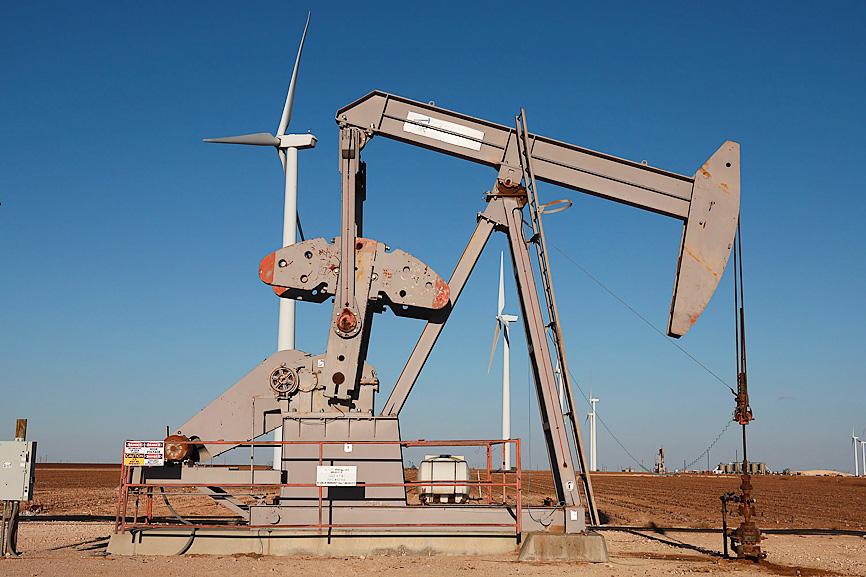Oil posted its first weekly loss since Russia invaded Ukraine and sparked one of the most tumultuous periods the market has ever experienced.
West Texas Intermediate for April delivery on Friday rose 3.12 percent to US$109.33 a barrel, but was down 5.49 percent from a week earlier.
Brent crude for May delivery gained 3.05 percent to US$112.67 a barrel, posting a weekly decline of 4.61 percent. The international benchmark settled more than US$30 off its Monday rally, which saw it surge to almost US$140.

Photo: AFP
Prices violently whipsawed over the five-day period due to a flurry of news including a US ban of Russian crude imports and the UK’s gradual phasing out of them. Much of the industry is already shunning Russian oil.
In the most recent demonstration of its pariah status, there were no buyers in a tender for crude from the country’s Far East. Nuclear talks also came to a standstill, prolonging the absence of Iranian barrels in a market desperate for additional supplies.
“Volatility is not going to disappear anytime soon,” said Tariq Zahir, managing member of the global macro program at Tyche Capital Advisors LLC.
You can see US$10 to US$15 increases at the “blink of an eye” due to a tight market and geopolitical risks, Zahir said.
The fallout from the war has rippled through commodity markets from wheat to key fuels such as gasoline and diesel. Increasing inflationary pressure around the world is forcing banks to contemplate a phase of monetary tightening that might choke off the rebound.
Rystad Energy AS has that predicted Brent could soar to an eye-watering US$240 a barrel this summer if countries continue to sanction Russian oil imports, while Goldman Sachs Group Inc said that demand destruction is the only way to buffer high prices.
“Extreme intraday volatility perhaps says something about several things: degree of uncertainty, the nature of the news flow, the spillover from some chaotic spot markets and the relatively low liquidity levels at some points,” Standard Chartered PLC head of commodities research Paul Horsnell said.
Mounting penalties against Russia have prompted fears that an already tight oil market might be stretched further, due to the absence of the country’s 5 million barrels of oil exports.
However, OPEC has said that there is no shortage, continuing its output hike of 400,000 barrels a day.
Open interest in the main oil futures contracts has plunged to a six-year low in the past few days, as traders retreat from risk. Volatility has rocketed, and exchanges have boosted margins, effectively raising the cost of buying and selling. Brent traded as high as US$139.13 a barrel this week, and as low as US$105.60.
Additional reporting by staff writer

Intel Corp chief executive officer Lip-Bu Tan (陳立武) is expected to meet with Taiwanese suppliers next month in conjunction with the opening of the Computex Taipei trade show, supply chain sources said on Monday. The visit, the first for Tan to Taiwan since assuming his new post last month, would be aimed at enhancing Intel’s ties with suppliers in Taiwan as he attempts to help turn around the struggling US chipmaker, the sources said. Tan is to hold a banquet to celebrate Intel’s 40-year presence in Taiwan before Computex opens on May 20 and invite dozens of Taiwanese suppliers to exchange views

Application-specific integrated circuit designer Faraday Technology Corp (智原) yesterday said that although revenue this quarter would decline 30 percent from last quarter, it retained its full-year forecast of revenue growth of 100 percent. The company attributed the quarterly drop to a slowdown in customers’ production of chips using Faraday’s advanced packaging technology. The company is still confident about its revenue growth this year, given its strong “design-win” — or the projects it won to help customers design their chips, Faraday president Steve Wang (王國雍) told an online earnings conference. “The design-win this year is better than we expected. We believe we will win

Chizuko Kimura has become the first female sushi chef in the world to win a Michelin star, fulfilling a promise she made to her dying husband to continue his legacy. The 54-year-old Japanese chef regained the Michelin star her late husband, Shunei Kimura, won three years ago for their Sushi Shunei restaurant in Paris. For Shunei Kimura, the star was a dream come true. However, the joy was short-lived. He died from cancer just three months later in June 2022. He was 65. The following year, the restaurant in the heart of Montmartre lost its star rating. Chizuko Kimura insisted that the new star is still down

While China’s leaders use their economic and political might to fight US President Donald Trump’s trade war “to the end,” its army of social media soldiers are embarking on a more humorous campaign online. Trump’s tariff blitz has seen Washington and Beijing impose eye-watering duties on imports from the other, fanning a standoff between the economic superpowers that has sparked global recession fears and sent markets into a tailspin. Trump says his policy is a response to years of being “ripped off” by other countries and aims to bring manufacturing to the US, forcing companies to employ US workers. However, China’s online warriors